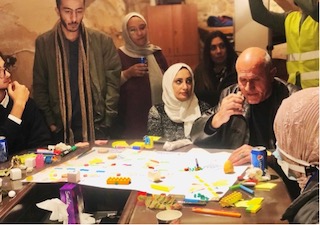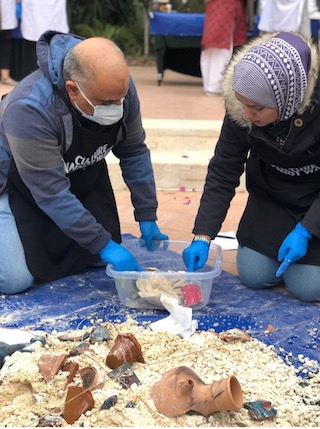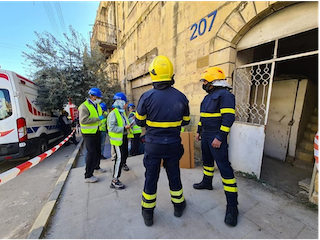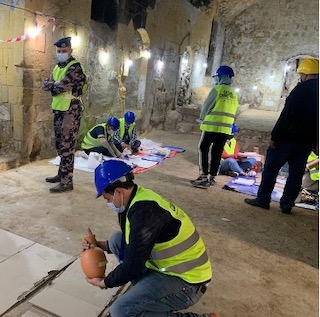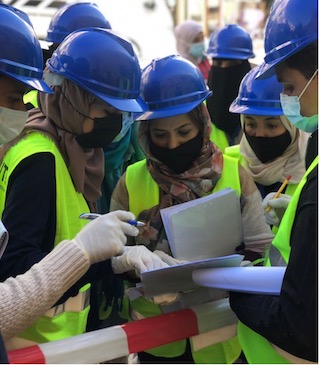Twenty-three months of blended learning, 20 participants and four mentors. Alliance for Cultural First Aid, Peace and Resilience is a cascading capacity development project of ICCROM conceived with the support of ALIPH foundation, and held in partnership with the Egyptian Heritage Rescue Foundation (EHRF) and Zurich based Centre for Security Studies (CSS).
The project aims to strengthen capacities for risk reduction, preparedness, response and recovery among communities adversely affected by a combination of armed conflicts, extreme hazard events and epidemics. It focuses on the Middle East, North Africa, Afghanistan and Pakistan (MENAP) region affected by intersecting conflicts, which in turn have led to extreme vulnerabilities to hazard events and health crises.
The in-person workshop component of the project was held in Amman, Jordan from 28 November to 12 December 2021. Amid ongoing COVID-19 travel restrictions and continuous uncertainty in Afghanistan, 15 participants and three mentors from nine countries namely, Afghanistan, Egypt, Iraq, Jordan, Libya, Pakistan, South Sudan, Syria and Yemen participated in the workshop.
Led by Aparna Tandon, Senior Programme Leader, FAR programme, a multidisciplinary team drawn from EHRF, CSS and FAR alumni network implemented the training. Sessions were immersive and hands-on, covering several topics such as conflict styles and mediation, oral history recordings, copyright and intellectual property rights management, cultural heritage first aid and disaster risk management, safeguarding intangible cultural heritage, as well as conducting post-disaster needs assessments.
Overcoming language barriers, the workshop was conducted in both English and Arabic through simultaneous translations.
Graciously hosted by the Department of Antiquities of the Kingdom of Jordan, the workshop featured a site visit to Petra, a World Heritage site since 1985 and one of the Seven Wonders of the World. Petra is described as one of the most precious examples of humankind’s cultural inheritance and benefits from a unique and significant rock formation. Participants had the chance to discover the archaeological site and engage with the Bedoul community, an ancient people that still has members living and practicing their traditional knowledge there.
Thanks to support extended by the As-Salt City Development Unit and its Director, Ms. Lina Saleh Abu Salem, on-site exercises and field activities on emergency documentation and stabilization of buildings and collections, were organized in Jagbeer House, As-Salt.
A core part of the workshop was the interaction and consultation with members of the local community and assessing local vulnerabilities and capacities in relation to disaster risk for heritage. Participants, together with the project team, invited eight residents of As-Salt city to play the game inSIGHT, developed by the FAR programme and build a common understanding of how the cultural heritage in the region is contributing to capacities for disaster risk reduction and sustainable development.
In order to put theory into practice, participants took part in a large-scale disaster simulation at the Fallah-Al-Hamad house in As-Salt, Jordan on 11 December. To further the goal of wider integration between first aid response, civil protection, humanitarian aid and development sectors, the simulation was conducted in close cooperation with the Jordanian Civil Defense Department. After the successful completion of the final simulation, the Department organized an emergency first response drill for the participants and the project team.
Closing ceremony under the patronage of HRH Princess Dana Firas
The closing ceremony for the workshop was organized under the patronage of Her Royal Highness, Princess Dana Firas at the Petra National Trust (PNT) in Amman on 12 December. During the ceremony, certificates were handed over to the 15 graduating participants, further expanding the network of ICCROM FAR’s 800+ cultural first aiders.
The two week in-person workshop of the Alliance for Cultural First Aid, Peace and Resilience, was organized by ICCROM alongside the ALIPH Foundation, the Egyptian Heritage Rescue Foundation (EHRF), and the Centre for Security Studies (CSS), Switzerland, in collaboration with the following:
- ICCROM - ATHAR Regional Conservation Centre, Sharjah, UAE
- Department of Antiquities (DOA), Jordan
- As-Salt City Development Unit
- The Civil Defense Department, As-Salt, Jordan
- Petra National Trust (PNT), Jordan
ICCROM would like to thank the Kingdom of Jordan for its support, hospitality, and assistance during the workshop, and is grateful for the cooperation of local partners.
What’s next?
Participants have presented their project ideas to an external jury comprising of Ms. Alexandra Fiebig, ALIPH Foundation and Dr. Zaki Aslan, ICCROM - ATHAR Regional Conservation Centre. In the next six months, they will be working on revising and implementing the field projects in their respective countries. The projects of the participants are context-specific and vary from first aid and stabilization to buildings and collections, training of heritage professionals and military personnel on safeguarding heritage in times of crisis, documentation of traditional knowledge, practices and endangered crafts, as well as digitization of historic records such as songs, poems and other significant documents.
Video credits: Ayoob Younus, Course participant and Project Manager at Volunteer With Us - Iraq
Core course team:
ICCROM: Aparna Tandon, Anthony Rizk, Fatma Marii, Hedaya Gharaibeh,Mohona Chakraburtty, Rahel Wolde Mikael, Yasmin Hashem
Egyptian Heritage Rescue Foundation (EHRF): Abdelhamid Salah, Amira Sadik Aly, Hebatallah Helmy
Mentors: Alia Saleh, Fahim Rahimi, Lama Abboud, Mir Wali Shah

